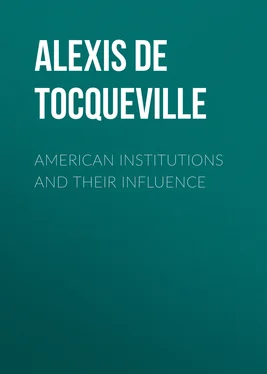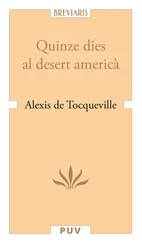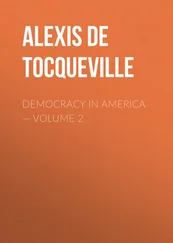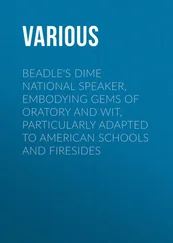Alexis de Tocqueville - American Institutions and Their Influence
Здесь есть возможность читать онлайн «Alexis de Tocqueville - American Institutions and Their Influence» — ознакомительный отрывок электронной книги совершенно бесплатно, а после прочтения отрывка купить полную версию. В некоторых случаях можно слушать аудио, скачать через торрент в формате fb2 и присутствует краткое содержание. Жанр: foreign_antique, Политика, foreign_edu, на английском языке. Описание произведения, (предисловие) а так же отзывы посетителей доступны на портале библиотеки ЛибКат.
- Название:American Institutions and Their Influence
- Автор:
- Жанр:
- Год:неизвестен
- ISBN:нет данных
- Рейтинг книги:5 / 5. Голосов: 1
-
Избранное:Добавить в избранное
- Отзывы:
-
Ваша оценка:
- 100
- 1
- 2
- 3
- 4
- 5
American Institutions and Their Influence: краткое содержание, описание и аннотация
Предлагаем к чтению аннотацию, описание, краткое содержание или предисловие (зависит от того, что написал сам автор книги «American Institutions and Their Influence»). Если вы не нашли необходимую информацию о книге — напишите в комментариях, мы постараемся отыскать её.
American Institutions and Their Influence — читать онлайн ознакомительный отрывок
Ниже представлен текст книги, разбитый по страницам. Система сохранения места последней прочитанной страницы, позволяет с удобством читать онлайн бесплатно книгу «American Institutions and Their Influence», без необходимости каждый раз заново искать на чём Вы остановились. Поставьте закладку, и сможете в любой момент перейти на страницу, на которой закончили чтение.
Интервал:
Закладка:
On one side were wealth, strength, and leisure, accompanied by the refinement of luxury, the elegance of taste, the pleasures of wit, and the religion of art. On the other were labor, and a rude ignorance; but in the midst of this coarse and ignorant multitude, it was not uncommon to meet with energetic passions, generous sentiments, profound religious convictions, and independent virtues.
The body of a state thus organized, might boast of its stability, its power, and above all, of its glory.
But the scene is now changed, and gradually the two ranks mingle; the divisions which once severed mankind, are lowered; property is divided, power is held in common, the light of intelligence spreads, and the capacities of all classes are equally cultivated; the state becomes democratic, and the empire of democracy is slowly and peaceably introduced into the institutions and manners of the nation.
I can conceive a society in which all men would profess an equal attachment and respect for the laws of which they are the common authors; in which the authority of the state would be respected as necessary, though not as divine; and the loyalty of the subject to the chief magistrate would not be a passion, but a quiet and rational persuasion. Every individual being in the possession of rights which he is sure to retain, a kind of manly reliance and reciprocal courtesy would arise between all classes, alike removed from pride and meanness.
The people, well acquainted with its true interests, would allow, that in order to profit by the advantages of society, it is necessary to satisfy its demands. In this state of things, the voluntary association of the citizens might supply the individual exertions of the nobles, and the community would be alike protected from anarchy and from oppression.
I admit that in a democratic state thus constituted, society will not be stationary; but the impulses of the social body may be regulated and directed forward; if there be less splendor than in the halls of an aristocracy, the contrast of misery will be less frequent also; the pleasures of enjoyment may be less excessive, but those of comfort will be more general; the sciences may be less perfectly cultivated, but ignorance will be less common; the impetuosity of the feelings will be repressed, and the habits of the nation softened; there will be more vices and fewer crimes.
In the absence of enthusiasm and of an ardent faith, great sacrifices may be obtained from the members of a commonwealth by an appeal to their understandings and their experience: each individual will feel the same necessity for uniting with his fellow-citizens to protect his own weakness; and as he knows that if they are to assist he must co-operate, he will readily perceive that his personal interest is identified with the interest of the community.
The nation, taken as a whole, will be less brilliant, less glorious, and perhaps less strong; but the majority of the citizens will enjoy a greater degree of prosperity, and the people will remain quiet, not because it despairs of melioration, but because it is conscious of the advantages of its condition.
If all the consequences of this state of things were not good or useful, society would at least have appropriated all such as were useful and good; and having once and for ever renounced the social advantages of aristocracy, mankind would enter into possession of all the benefits which democracy can afford.
But here it may be asked what we have adopted in the place of those institutions, those ideas, and those customs of our forefathers which we have abandoned.
The spell of royalty is broken, but it has not been succeeded by the majesty of the laws; the people have learned to despise all authority. But fear now extorts a larger tribute of obedience than that which was formerly paid by reverence and by love.
I perceive that we have destroyed those independent beings which were able to cope with tyranny single-handed; but it is the government that has inherited the privileges of which families, corporations, and individuals, have been deprived; the weakness of the whole community has, therefore, succeeded to that influence of a small body of citizens, which, if it was sometimes oppressive, was often conservative.
The division of property has lessened the distance which separated the rich from the poor; but it would seem that the nearer they draw to each other, the greater is their mutual hatred, and the more vehement the envy and the dread with which they resist each other's claims to power; the notion of right is alike insensible to both classes, and force affords to both the only argument for the present, and the only guarantee for the future.
The poor man retains the prejudices of his forefathers without their faith, and their ignorance without their virtues; he has adopted the doctrine of self-interest as the rule of his actions, without understanding the science which controls it, and his egotism is no less blind than his devotedness was formerly.
If society is tranquil, it is not because it relies upon its strength and its well-being, but because it knows its weakness and its infirmities; a single effort may cost it its life; everybody feels the evil, but no one has courage or energy enough to seek the cure; the desires, the regret, the sorrows, and the joys of the time, produce nothing that is visible or permanent, like the passions of old men which terminate in impotence.
We have, then, abandoned whatever advantages the old state of things afforded, without receiving any compensation from our present condition; having destroyed an aristocracy, we seem inclined to survey its ruins with complacency, and to fix our abode in the midst of them.
The phenomena which the intellectual world presents, are not less deplorable. The democracy of France, checked in its course or abandoned to its lawless passions, has overthrown whatever crossed its path, and has shaken all that it has not destroyed. Its control over society has not been gradually introduced, or peaceably established, but it has constantly advanced in the midst of disorder, and the agitation of a conflict. In the heat of the struggle each partisan is hurried beyond the limits of his opinions by the opinions and the excesses of his opponents, until he loses sight of the end of his exertions, and holds a language which disguises his real sentiments or secret instincts. Hence arises the strange confusion which we are beholding.
I cannot recall to my mind a passage in history more worthy of sorrow and of pity than the scenes which are happening under our eyes; it is as if the natural bond which unites the opinions of man to his tastes, and his actions to his principles, was now broken; the sympathy which has always been acknowledged between the feelings and the ideas of mankind, appears to be dissolved, and all the laws of moral analogy to be abolished.
Zealous Christians may be found among us, whose minds are nurtured in the love and knowledge of a future life, and who readily espouse the cause of human liberty, as the source of all moral greatness. Christianity, which has declared that all men are equal in the sight of God, will not refuse to acknowledge that all citizens are equal in the eye of the law. But, by a singular concourse of events, religion is entangled in those institutions which democracy assails, and it is not unfrequently brought to reject the equality it loves, and to curse that cause of liberty as a foe, which it might hallow by its alliance.
By the side of these religious men I discern others whose looks are turned to the earth more than to heaven; they are the partisans of liberty, not only as the source of the noblest virtues, but more especially as the root of all solid advantages; and they sincerely desire to extend its sway, and to impart its blessings to mankind. It is natural that they should hasten to invoke the assistance of religion, for they must know that liberty cannot be established without morality, nor morality without faith; but they have seen religion in the ranks of their adversaries, and they inquire no farther; some of them attack it openly, and the remainder are afraid to defend it.
Читать дальшеИнтервал:
Закладка:
Похожие книги на «American Institutions and Their Influence»
Представляем Вашему вниманию похожие книги на «American Institutions and Their Influence» списком для выбора. Мы отобрали схожую по названию и смыслу литературу в надежде предоставить читателям больше вариантов отыскать новые, интересные, ещё непрочитанные произведения.
Обсуждение, отзывы о книге «American Institutions and Their Influence» и просто собственные мнения читателей. Оставьте ваши комментарии, напишите, что Вы думаете о произведении, его смысле или главных героях. Укажите что конкретно понравилось, а что нет, и почему Вы так считаете.












